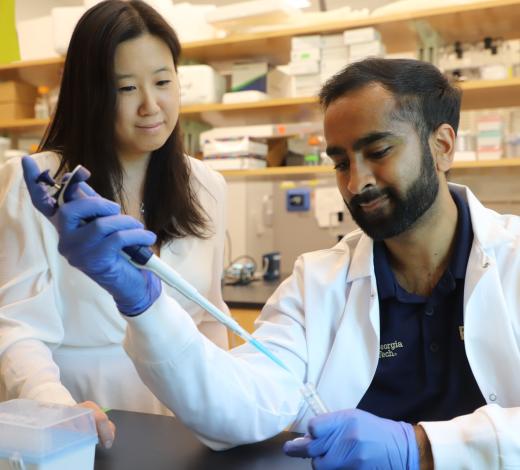Immunoengineering
Overview
Immunoengineering is a rapidly evolving interdisciplinary field that merges engineering principles with immunology to unlock the full potential of the immune system. At the Wallace H. Coulter Department of Biomedical Engineering, our research focuses on quantitatively understanding immune molecules, cells, and tissues to uncover how the immune system functions in both health and disease. Through this work, we aim to design innovative therapeutic strategies and develop breakthrough tools for personalized and predictive healthcare.
Our immunoengineering efforts are deeply collaborative, interfacing with the Center for Immunoengineering at Georgia Tech, Emory University, the CDC, Children’s Healthcare of Atlanta, and the NSF Cell Manufacturing Center, among others. Faculty and students are leading pioneering research across diverse areas including cancer, infectious diseases, regenerative medicine, wound healing, inflammatory conditions, microbiome science, and autoimmunity—driving forward the future of immune-based biomedical innovation.
Research Focus
Our immunoengineering research integrates systems biology, biomaterials, synthetic biology, and computational tools to develop next-generation immune-modulating therapies. Key focus areas include:
- Vaccines and Immunotherapies: Designing novel immune-activating treatments for cancer and infectious diseases
- T and B Cell Engineering: Modifying immune cells for targeted therapeutic applications
- Immune Cell Manufacturing: Scalable production of engineered immune cells for clinical use
- Rapid Diagnostics and Bioelectronic Devices: Point-of-care technologies for early immune response detection
- Immune Mechanobiology: Understanding how mechanical forces influence immune cell behavior.
- Systems Immunology & Computational Modeling: Deciphering host-immune interactions through data-driven methods
- Immunomodulatory Biomaterials: Materials that enhance or suppress immune activity as needed
- Multiscale Immune Engineering: Integrating materials, gene editing, and immunodelivery strategies
- Single-Cell and Multi-Omics Tools: High-resolution analysis of immune responses at the cellular level
- Image-Guided Immunotherapies: Combining imaging tools with immune-targeted treatments.
Application Areas
- Cancer Immunotherapy: Engineering immune responses to eliminate tumors
- Infectious Disease Control: Vaccine and diagnostic innovations for rapid response
- Autoimmune and Inflammatory Diseases: Modulating immune activity for chronic conditions
- Wound Healing and Regenerative Medicine: Enhancing tissue repair through immune regulation
- Microbiome-Immune Interactions: Understanding the role of microbial communities in immune function.


























